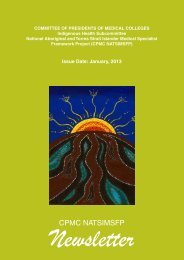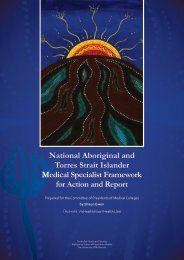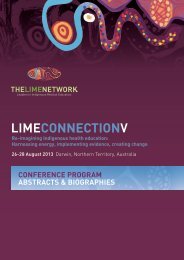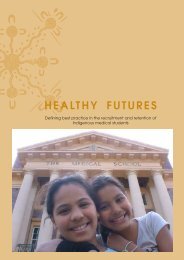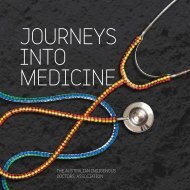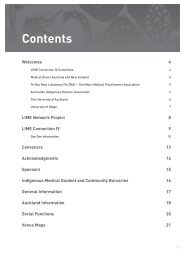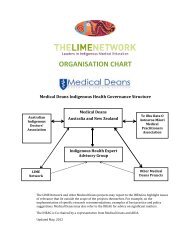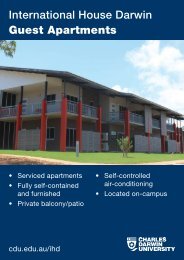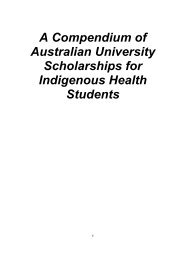abstracts and bios cover_final.indd - LIME Network
abstracts and bios cover_final.indd - LIME Network
abstracts and bios cover_final.indd - LIME Network
You also want an ePaper? Increase the reach of your titles
YUMPU automatically turns print PDFs into web optimized ePapers that Google loves.
Mr Malcolm HeffernanMalcolm is from the Anmatjere <strong>and</strong> Northern Arrernte tribes but has strong familyties with the Eastern Arrernte language group as well. He speaks a number of CentralAustralian Aboriginal Languages which consists of Eastern Arrernte, Anmatjere <strong>and</strong>Pitjantjara as well as English. Malcolm became a registered Aboriginal Health Workerwith the Northern Territory Government in 1984 where he was based at Ti Tree WellRoadhouse. Within this job he <strong>cover</strong>ed a vast area between Ti Tree six mile, Ti TreeStation, Stirling, Barrow Creek, Nuetral Junction, Aileron <strong>and</strong> Napperby up until 1993.He later graduated as a qualified Aboriginal Interpreter <strong>and</strong> during his studies with theInstitute of Aboriginal Development Malcolm was granted employment as an AboriginalLiaison Officer within the Aboriginal Support Services Unit at the Alice Springs Hospital in 2004. Malcolm’srole within the ASSU requires him to provide interpreting <strong>and</strong> cultural brokerage services to Aboriginalpatients, their families <strong>and</strong> medical staff at the hospital.Exploring some success stories from hospitals successfully responding to Aboriginal<strong>and</strong> Torres Strait Isl<strong>and</strong>er peopleMs Angela Clarke 1 , Mr John Willis 2 , Mr Alwin Chong 3 , Ms Lyn McInnes 41. Deputy Director/Lecturer, Onemda VicHealth Koori Health Unit, The University of Melbourne;2. Project Manager, Improving the Culture of Hospitals project, LaTrobe University;3. Research <strong>and</strong> Ethics Officer, Aboriginal Health Council of South Australia;4. Aboriginal Hospital Liaison Officer, Department of Aboriginal Health, Geelong Hospital,Barwon HealthAbstractThe health status of Indigenous peoples is a global concern with mortality <strong>and</strong> hospitalisation data indicatingthat the health of Indigenous groups falls below that of other ethnic groups within their countries. TheAustralian Federal Government has acknowledged their responsibility to respond to this issue <strong>and</strong> ensure thatthe health gap between Aboriginal <strong>and</strong> non-Aboriginal Australians is addressed. The Improving the Culture ofHospitals project is contributing to closing this gap by developing a range of resources, tools <strong>and</strong> guidelines toassist hospitals across Australia tackle vital cultural reforms which can improve the way they provide servicesto Aboriginal <strong>and</strong> Torres Strait Isl<strong>and</strong>er communities.This presentation will outline the results from the initial round of case studies that were used to draft thequality improvement process, toolkit <strong>and</strong> resources. These case study results indicate that hospitals thatwere considered to be successfully addressing the issues of their Aboriginal <strong>and</strong> Torres Strait Isl<strong>and</strong>erpatients shared the following essential characteristics: strong partnerships with Aboriginal communities;enabling state <strong>and</strong> federal policy environments; leadership by hospital Boards, Chief Executive Officer/GeneralManager’s <strong>and</strong> key clinical staff; strategic policies within their hospitals; structural <strong>and</strong> resource supports;<strong>and</strong> commitment to supporting the Aboriginal workforce. The presentation will highlight some case examples<strong>and</strong> emphasis how this work, when embedded in a quality improvement approach, can bring about sustainablechange.50



